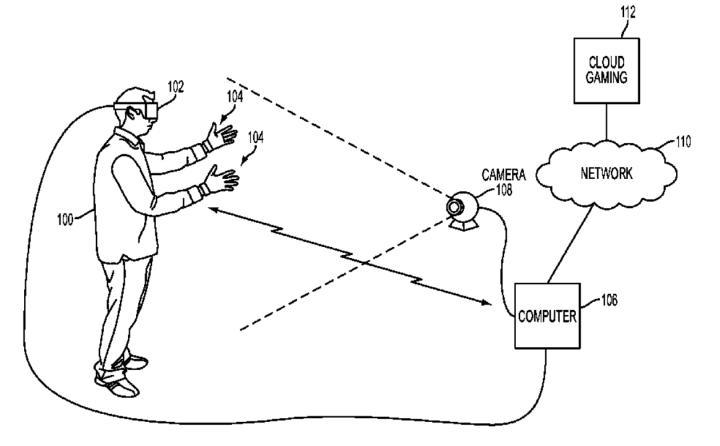
Gloves are likely to become a widely adopted form of controls for virtual reality, which raises the level of immersion greatly. And while Sony is putting the pedal to the metal, the glove on display is reminiscent of other hardware. An excellent example of this is the Hands Omni which was showcased last year. The last word on that project was that it would be implemented into Virtuix’ VR treadmill Omni. In particular, similar features include haptic feedback and digital representations of how you move your hands and fingers in the real world. Rather than a piece of revolutionary hardware, it’s likely the most natural course for things to progress in VR. Method of execution and hardware might differ, however.
Related Offer: PlayStation VR at Gamestop | Playstation VR at Best Buy
But back to that digital cloud Sony mentions. In particular are two sections of interest. In the first, Sony writes that “the computer 106 functions as a thin client in communication over a network with a cloud gaming provider 112.” All content would be processed first via the cloud gaming provider, and then optionally processed again by (presumably) a consumer device before streaming data like video, audio, and controller input to the VR headset.
The company even goes so far as to propose that the headset could connect directly to a router in your home, without connecting to any form of console or graphical processing hardware. That’s a pretty huge step, and it would essentially allow Sony to make PlayStation VR standalone. Similar to GameFace but with most of the processing done in a room you’ll never see. Sony’s headset is currently limited by the hardware inside its two year old PlayStation 4 (PS4). Time passes quickly in the tech world, and Sony’s current VR headset doesn’t pass 1080p. It won’t be long before the resolution of Sony’s headset is outrun by phones capable of rendering 4K in VR.
Sony has already said that it’s pricing PlayStation VR as a new gaming platform, even if it’s not limited to gaming content. And perhaps that’s exactly what Sony wants this to be. The headset we’ve seen so far might be limited to use with the PS4, but it also might not. And with a patent like this in the open, it wouldn’t be surprising to see Sony release PlayStation VR in ongoing iterations and have it become something completely different than the PS4. It certainly wouldn’t be limited by the hardware’s inability to render at resolutions higher than 1080p.
Editors' Recommendations
- This PS5 Pro leak reveals a massive jump in performance
- This amazing desktop mod combines a PS5 and gaming PC into one system
- The PS5 is basically a custom gaming PC, and that’s good news for fans
- What will PlayStation 5 and Xbox Series X games look like at launch?
- AMD bullish on Xbox Series X, PlayStation 5 sales despite coronavirus


